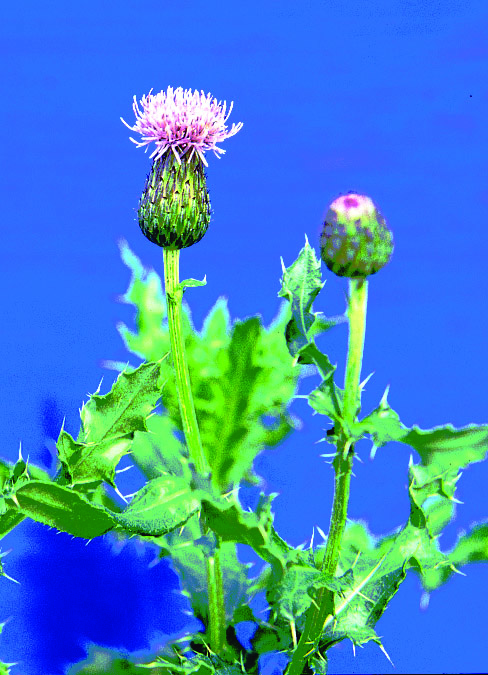
Canada thistle is classified as a noxious weed in Minnesota.
city council
Nancy Edmonds Hanson
Whether or not to apply herbicides to weedy city parks spurred a thorny debate for the Moorhead City Council Monday. They weighed the Park Board’s unanimous request to kill weeds in 12 of the city’s 24 parks that commissioners say have become overrun against concerns for pollinators and those who forage for berries and wild plants there.
Ultimately, their decision came down to a compromise of sorts: The designated parks deemed the most badly weed-infested will be sprayed with herbicide this fall. But the Public Works Department and Park Board will look for more environmentally friendly alternatives over the winter with an eye to instituting Minnesota’s GreenStep Cities recommendations next year.
At issue, according to Park Board chair James Hand and Public Works director Steve Iverson, is that the summer drought has let noxious weeds – particularly Canada thistle – to overpower dormant grass and come to dominate some areas. No herbicides have been applied in past months due to the council/s resolution May 10 prohibiting chemical weed killers on city property.
“The drought was not so good for grass, but great for weeds,” Iverson observed. He said that weeds have proliferated to the point that some areas of turf may not survive, requiring costly reseeding and renewal next spring.
Hand told the council that his group weighed the available alternatives – applying the only herbicide currently available, which affects all broadleaf species, or digging the thistles and other problem plants up by hand. The latter option is clearly untenable, given the widespread infestations.
Council member Laura Caroon said she has heard complaints that some parklands are not only unkempt, but virtually unusable at this point. Member Larry Seljevold echoed her concern: “Some areas are half thistles. Why give kids a park if they can’t play in it?”
Council member Shelly Dahlquist, who proposed the pesticide ban last spring, stressed her support of seeking the GreenStep guidance, avoiding harm to pollinators. Heather Nesemeier expressed her concern for foragers who scour the parks for edible plants. Deb White questioned whether backpack spraying could be used to specifically target the thistles rather than resorting to widespread spraying, which she said would limit the poison’s drift into other areas.
But support for immediate spraying was emphatic. “We have these green spaces. They’re part of our quality of life, and we should be able to use them,” council member Chuck Hendrickson asserted. “Johnson Farm Park is just weed after weed after weed. We need to take care of it now, and then look for a greener way to eradicated them next spring.”
Matt Gilbertson concurred: “Let’s get ahead of this. I’m fully in favor of this. I trust you guys” (Public Works) to know where to spray.” Parks included in the resolution are MB Johnson, Johnson Farms, Horizon Shores, Village Green, Village Green East, Village Green Sixth, Meadows, Stonemill, Trails at Stonemill, Davey/Memorial, Queens, and Woodlawn. Other parks would not be affected.
After defeating an amendment by White and Dahlquist that would have removed M.B. Johnson Park from the list, the council voted 4 to 3 to proceed against the thistles and other unwelcome weeds. Voting in favor were Gilbertson, Caroon, Seljevold, Lindaas and Hendrickson.
After the vote was taken, the council clarified that the permission to use herbicides applies only to this fall, and that they expected the department and Park Board to come back with a more natural plan from GreenStep before next spring.
Later in the meeting, city manager Dan Mahli share another milestone related to Minnesota’s program to help cities achieve environmentally sound, sustainable management goals in five categories, including buildings and lighting, land use, transportation, environmental management and resiliency. He told the group, “Moorhead has just achieved step four – out of five – in the GreenStep Cities program.” Only one step remains for certification: showing improvement in city performance metrics.


